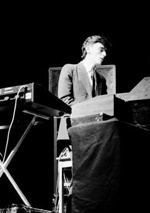
The other songs from the past went even further back, being a set of promo CDRs that will make up the Simple Minds Silver Box Set, also set to be released in October. There was a long period of time when I could not listen to a Simple Minds record of any kind, but there was also a time when I could listen to little else, the Simple Minds story being about one of the most dramatic changes of cultural direction imaginable in the world of Pop. It all started so promisingly, in the world of the post-punk fallout; in a time when everything hinted at by Punk came to fruition; the time when the raw rínír spit and holler gave way to strange dreamers of psychedelic cities in the sky; the time when the Punk spirit coalesced with a love of Krautrock motorik electronics and hinted again at returns to its glam Art School roots. So the story of the early Simple Minds is that of a sketchy, edgy debut album with a clutch of moments to raise an eyebrow; is that of a dark brooding second album filled with madcap midnight walks down European post war side streets with the warped ghosts of an early Roxy Music for company; is that of a third album that took the European dreaming further and created a soundtrack to inward journeys through smoky Budapest railway station cafes and booking halls. One of the CDs in the Box Set then collects John Peel Session and John Leckie produced demos for selections of those albums: fascinating moments that remind us that the connections between that early Simple Minds and the mighty Magazine were more than skin deep.
Fourth / fifth album set Sons and Fascination / Sister Feelings Call was a gem of supple rhythmic hypnotism, an expressionist masterpiece of angular guitar bursts to the heart, keyboard stabs in the eyes and elliptical bass lines making rhythm and melody all at once. It sounded threatening, celebratory, melancholic and inspirational. The Steve Hillage demos on CD 2 of the set are edgier, emptier than the albums themselves, but are no less impressive. These were recordings that cast eyes backwards and forwards all at once; that drew from the past and that dared to dream of where Pop might go in the future.
Sadly the future got derailed.
Had Simple Minds broken up in 1982, had they suffered some tragic suicide or death, we'd be seeing lengthy magazine articles telling us all how influential and important they were. Instead, they descended into a nightmare world of Stadium Rock of the worst pomposity and inflated egoism. For sure, the New Gold Dream songs from BBC radio sessions included on CD 2 still have some optimistic sparkle, but by the time the disc ends on monstrously overblown 1985 live recordings from Glasgow (with guest appearance from Bono) and a Live Aid rehearsal of ĎDonít You Forget About Meí you know the game is up. Stadium Rock, Pringle sweaters, stone washed jeans and Casual crews with Stanley knives were waiting in the wings: Context is everything, indeed.
And you see the thing is that listening again now I still find something promisingly transcendental about those early Simple Minds recordings. I know itís impossibly unfashionable to say so, but I still hear the echoes of dreams that spoke of bright possibilities up above the clouds. Itís music that still sounds as though it strives for something just out of reach, music that builds impossible towers to grasp at passing comets. And, particularly in light of what came later, there is something both unbearably sad and improbably inspiring in that sound.
© 2004 Alistair Fitchett